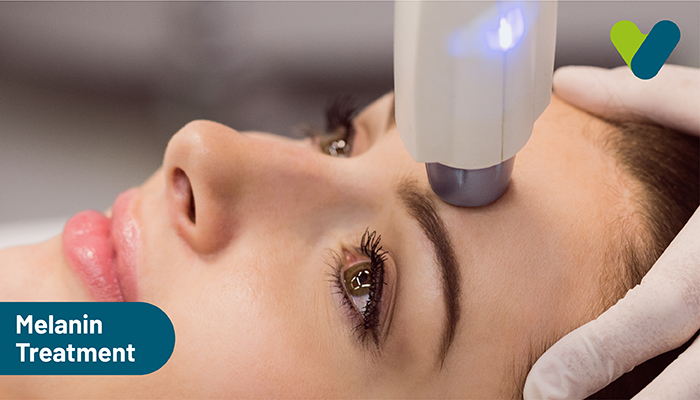Melanin is the pigment that gives skin, hair, and eyes their colour. It is produced by cells known as melanocytes, which are in the epidermis of your skin. Everyone has roughly the same amount of melanocytes. However, some individuals' cells produce more melanin and particular forms of melanin than others. The more melanin a person has, the darker their skin will be. Sometimes, melanin can accumulate in some locations and create hyperpigmentation, which is a darkening of the skin. Hyperpigmentation is a condition in which certain areas of skin are darker than others. Hyperpigmentation, often known as skin darkening, results from melanin concentrations across the body. There are a range of therapeutic treatments to remove melanin from the skin or reduce melanin production, but there are also many risks and limitations.
Reducing skin melanin
There are many strategies to diminish melanin deposits on the skin. Consult a physician for advice for a suitable melanin treatment.- Treatment with lasers
Laser treatments include:
- Ablative laser: The lasers get rid of the dead cells of the epidermis that contains excess melanin and specialists may reinforce the procedure with a Q-switched pigment-selective laser to reach into deeper lesions in the dermis without generating severe adverse effects.
- The Q-switched ruby laser (QSRL): The laser treatment is for heating and eliminating melanin cells. The treatment may not be suitable for all, just like with any medical procedure, as it may result in infections, scarring, and problems with pigmentation. Consult a specialist for advice before starting therapy and have a skin test to see if this is the best course of action for your skin.
- Non-invasive laser treatment: The melanin reducing treatment is less invasive than other laser treatments and aids in promoting the production of collagen and regeneration of the skin. Intense pulsed light, or IPL, is one of these procedures. The technique uses brief bursts of light energy to heat and destroy melanin, hence eliminating blemishes.
- Topical creams or lotions There are a range of topical products to lighten the skin, which can help reduce melanin to a great extent. Prescription and over-the-counter skin whitening products frequently contain kojic acid, hydroquinone, glycolic acid, vitamin C, retinoid, and azelaic acid. These compounds inhibit tyrosinase, the key enzyme involved in the production of melanin. The creams will inhibit the production of melanin so that the skin would be lighter. However, skin-lightening lotions can have adverse side effects like irritation, redness, dryness, and itching. Consult a dermatologist before using these products to avoid damaging effects to the skin and general health.
- Natural treatments The skin can be lighter using a variety of natural approaches. However, it is not easy to predict how long it will take for each person to experience the results. It is vital to be patient and carry out regular maintenance to implement the remedies that include the following:
- ACV: Apple cider vinegar is used to lighten skin discolouration. The acetic acid and polyphenols in ACV can protect skin cells. It is effective for hyperpigmentation and can be effective for some skins. Dermatologists can recommend diluting the ACV and applying it on the pigmented area twice a day for a few minutes and rinsing well. If you notice irritation, you can stop the treatment.
- Red Onions: Red onions or scallions can help lighten the skin. It inhibits cell processes that cause increased pigmentation. A red onion can be crushed into a paste and applied directly over the pigmented area.
- Potatoes: Catecholase, an enzyme found in potatoes, works as a natural skin bleach and is effective for curing sunburn, freckles, dark elbows and underarms. It helps brighten the skin while eliminating pigmentation. Apply potato juice to the affected areas for a few minutes or till it dries every other day for a few months for best results.
- Lime juice: Lime juice is a natural bleaching agent and can be used to lighten dark patches. Clogged pores with debris, oil, and dead skin cells trigger acne, zits, and blemishes. They are frequent issues for those with oily skin. The bacteria found in face pores exacerbate inflammation, leading to increased redness and irritation. Lime juice's antibacterial qualities limit the growth of acne-causing bacteria. Apply it with a cotton ball to the discoloured areas of your skin and leave it on for 30 minutes. If you experience irritation, you can dilute the lime juice. However, ensure that you remain indoors and avoid direct sunlight exposure, as this cure may make your skin photosensitive. To prevent acne and blemishes, you can make a face mask of lime juice and turmeric or with chickpea flour. Lime juice's acidic nature will regulate excess oil, and chickpea flour is an effective exfoliator. This face mask should be applied weekly as part of your skin care routine.
Wholesome foods are powerful treatment agents
The goal is to consume wholesome foods that include high-quality proteins, plenty of fibre, healthy oil, raw fruits, dry fruits, vegetables, and spices that promote healthy skin. In addition, foods rich in amino acids promote active skin cell formation and operate to tighten facial skin. Avoid greasy foods, such as deep-fried dishes, as they can harm your skin by generating dark spots, inflammation, and hyperpigmentation.Precautions
Skin lightening comes with its share of risks. If you try to reduce melanin, you may experience:Sensitivity and irritability: Some elements or chemicals can irritate your skin. The bleaching or lightening process is harsh on the skin. Redness, itching, and contact dermatitis can be side effects of the medications.
UV exposure: Reduced melanin translates to less protection against the sun's rays, which increases the likelihood of wrinkles, textural irregularities, and skin discolouration.
Risk of skin cancer: The exposure to UV rays of the sun can also increase the likelihood of getting skin cancer.
